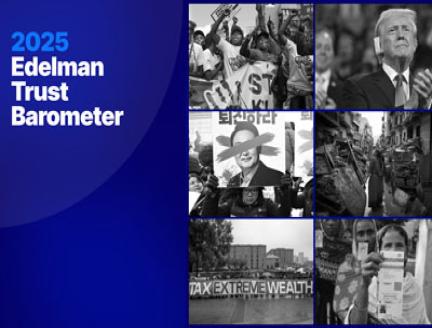As South Africa recovers from recent civil unrest, and grapples with continued inequality and an ongoing global health crisis, the private sector is going to have to double down on taking action to improve society, whether through direct intervention, speaking out or creating new partnerships.
“More and more, people are turning towards business for solutions, and it is up to these trusted entities to realise that the voices of their leadership are louder than ever before,” said Karena Crerar, Managing Director of Edelman South Africa.
Edelman’s recently released Trust Barometer update, A World in Trauma, has shown that business continues to be South Africa’s most trusted institution, surpassing the mainstream media, non-governmental organisations and the State itself. The new data showed that – higher than any other country surveyed – 71% of South Africans believe the country cannot overcome its challenges without business’ involvement, from issues of job creation to the COVID-19 recovery.
A positive revelation of this new research is that the public values business’ contributions to the work often performed by government. This includes pandemic response, disseminating quality health and safety information and even driving economic growth.
Crerar believes many business entities across various sectors will have to get involved in closing the gaps left by government, either by providing consultation or direct resourcing. Whether dealing with the pandemic or recovering from the damage caused by recent political unrest, relying exclusively on government response and resources is no longer an option.
“Business can assist through their expertise, but leaders are going to have to be able to set their egos aside. This isn’t about credit, this is about helping the country recover at a time where we are facing major upheaval,” she said.
“Much of this will come down to previous crisis experience, where prediction and proactive action can make all the difference when dealing with potential harm,” said Crerar.
For example, during the recent civil unrest, several businesses made pre-emptive moves to protect their employees and customers. Even before the unrest intensified across Gauteng and KwaZulu-Natal, it was leadership structures like Business Unity South Africa (BUSA) who were able to predict the need for further government intervention, maintaining calm among their members while also expressing concern about “anarchy” affecting their livelihoods. A week later, BUSA is using the power of their members’ voices to develop solutions, urging the State to establish a disaster relief fund to help affected businesses.
Leveraging the influence held by business for the greater good isn’t only about creating direct, societal change, it’s also integral to maintaining and continuing to build trust from within.
From an internal perspective, it is vital for business leadership is to ensure that employees know they are protected, respected and that they serve a greater good. Our trust research has suggested that businesses have to respond to social issues to maintain trust in their employee networks.
Even after the more intense waves of the ongoing pandemic, business will have to embrace the new ways of working that have been introduced, and this includes a greater emphasis on social and personal responsibility within a business.
According to the recent data, the demand for a company to address social ills is also rising. 86% of South African employees surveyed expected their employers to act on major social issues such as climate change or racism. Yes, this has a financial impact on a business. But getting involved in addressing societal issues such as sustainability or inclusion must be about more than rhetoric. Not only does this purpose-filled work benefit the people who need it most, it ultimately cascades into greater trust with employees, consumers and fellow business practitioners.
This too has a knock-on effect, where employees who believe their company has an authentic purpose are more likely to become unofficial advocates for their business. Talent retention and overall morale improves, and as many business leaders have learnt throughout the past year, keeping up people’s spirits has never been more important.
Key to this, says Crerar, is a keen focus on communication.
“If there ever was a time to overcommunicate, now is that time. When people are in the dark, they feel insecure, which is why transparency, accountability and connection are so important right now, especially when we can’t always be face-to-face with our colleagues,” she said.
Crerar recognizes that these rising expectations on the private sector, both internally and externally, may be daunting, but this growth in public trust can be the seed that allows business to create partnerships with other entities – so no sector has to go it alone.
“No one institution can solve problems of this magnitude, and it will be up to the partnerships across the spectrum – the media, the NGO-space, government and the private sector – to guide us towards stability and prosperity,” she said.




